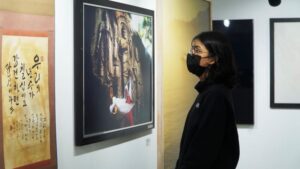Team L&M
Korean Cultural Centre India is holding an exhibition titled The Evolving Canvas of Korea, the possibility of K-Art. There are a total of 56 artworks, presented in seven different sections and categories viz Media, Painting, Ceramics, Crafts, Calligraphy, Photography, and Pop Art.

A visitor at the show
Section 1 Media Art – Mobility of Light, The Creation
This section consists of one media work titled Cartoon Folding On Screen by artist Lee Lee Nam. Lee is a world-renowned media artist, and his artwork is truly unique in its digital format, transcending the confines of traditional monitor frames and bridging eras and cultures. Through a captivating metaphor of cannonballs flying through art history and contemporary issues, the piece offers a poignant critique of power dynamics in the art world. Lee’s artwork was also exhibited at the India Art Fair in New Delhi in February 2024, and it generated a lot of interest among art enthusiasts.
Section 2 Fine Art – Beauty of Life
This section consists of 12 paintings including works of artist Lee Sook-Jin, Park Young Nam, Claude Rahir, Ryu Ji Sun, Park Mi Won, Park Sung Yu, Kim Hankook and Kim Deok Han. While Lee Sook-Jin’s painting titled “Days-Blue 2013” embodies the evolving nature of Korean art, reflecting tranquility and progress. Claude Rahir’s painting titled “Little Story of Hangul” unravel the mysteries of the Korean alphabet and captivates the narrative honouring the creation of Korea’s unique script and its profound impact on cultural identity.
Peonies Morando, Artist – Park Young Nam
Section 3 Pop Art – Collage of Korea
This section, aptly titled “Collage of Korea”, has 10 video displays that run simultaneously, each display showcasing the dynamism of the Korean society. Each display covers a certain theme such as Culture, Cities, Seasons, Sports, Styles, Food, Technology, Cultural Diplomacy, Movie and Drama. This installation is a representative work that well captures the theme of this exhibition.
Section 4 Handicrafts & Ceramics – Solemn Soul Touch
There are a total of 12 ceramics kept on display in this section that highlight the artistic developments that took place in the Korean Peninsula.
Section 5 Calligraphy Art- Brushstrokes of Harmony
This section embraces the Korean Calligraphy, where each stroke embodies the essence of unity, love, and hope. Marvel at the profound messages conveyed by artists such as Seo Jeong Su, Seo Bok Hee, and Chung Tae Hee, as they express themes of love, longing, and hope through their intricate brushstrokes, encapsulating the enduring spirit of unity and friendship in Korean culture.
Section 6 Photos – Encounter of Light & Color
In this section, the viewer is taken on a journey through iconic scenes of Korean life captured through photography, where each image tells a story of unification, love, and resilience. From the serene beauty of sunrise to the vibrant festivities of Busan Fireworks, explore the rich tapestry of Korean culture depicted in images by Sampa Guha Majumdar and Kim Kyung Sang.
Section 7 Ko-In Clouding – Collage of Korea 2
This section consists of a projector installation featuring media work that describes the strong bond between the two nations – India and Korea.
Speaking about the K-Art collection exhibition on display, Hwang Il Yong, Director of Korean Cultural Centre India said, “With great interest in Korean culture in India, we would like to present an art exhibition showcasing the works of art that match Korean cultural contents which Indian public is familiar with. The theme that runs through the exhibition and its works, from video, media, calligraphy showcasing the dynamism of the Korean alphabet to ceramics, crafts, photography, and abstract paintings, is ‘Dynamic Korea’, which means Korea continues to evolve and be dynamic. We aim to form a discourse on Korean art through an exhibition program that not only professional artists and critics but also the public can easily understand, sympathise with, and participate in.”
On view till April 25 at Korean CulturalCentre India, Lajpat Nagar, New Delhi